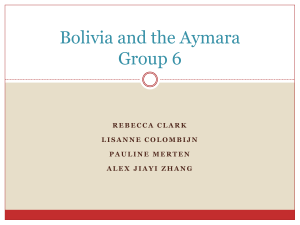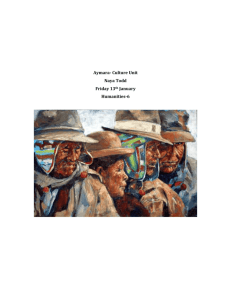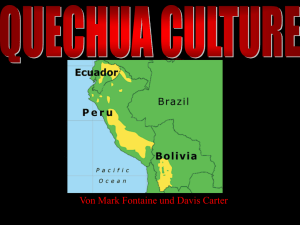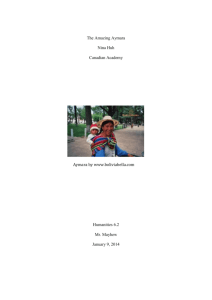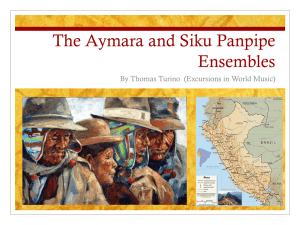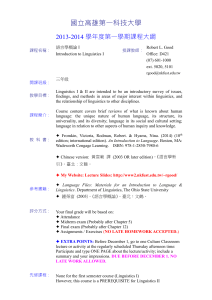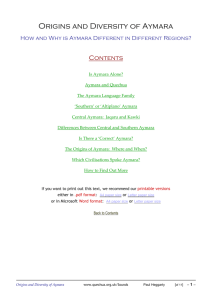MJ Hardman Vita - The Organization for the Study of Communication
advertisement
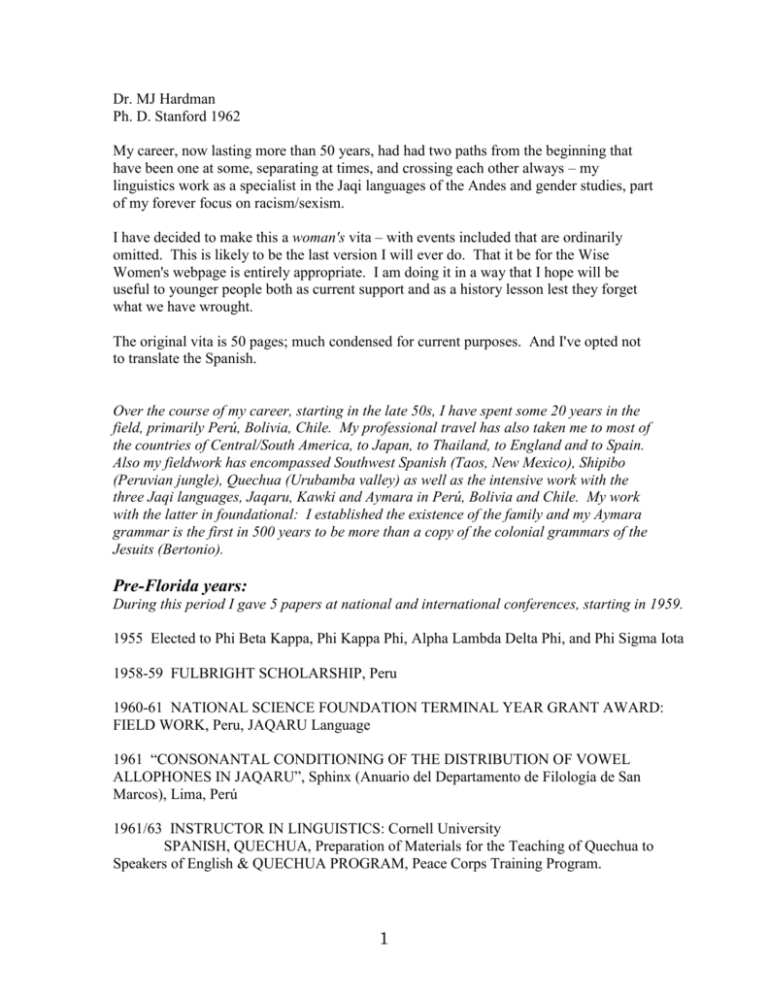
Dr. MJ Hardman
Ph. D. Stanford 1962
My career, now lasting more than 50 years, had had two paths from the beginning that
have been one at some, separating at times, and crossing each other always – my
linguistics work as a specialist in the Jaqi languages of the Andes and gender studies, part
of my forever focus on racism/sexism.
I have decided to make this a woman's vita – with events included that are ordinarily
omitted. This is likely to be the last version I will ever do. That it be for the Wise
Women's webpage is entirely appropriate. I am doing it in a way that I hope will be
useful to younger people both as current support and as a history lesson lest they forget
what we have wrought.
The original vita is 50 pages; much condensed for current purposes. And I've opted not
to translate the Spanish.
Over the course of my career, starting in the late 50s, I have spent some 20 years in the
field, primarily Perú, Bolivia, Chile. My professional travel has also taken me to most of
the countries of Central/South America, to Japan, to Thailand, to England and to Spain.
Also my fieldwork has encompassed Southwest Spanish (Taos, New Mexico), Shipibo
(Peruvian jungle), Quechua (Urubamba valley) as well as the intensive work with the
three Jaqi languages, Jaqaru, Kawki and Aymara in Perú, Bolivia and Chile. My work
with the latter in foundational: I established the existence of the family and my Aymara
grammar is the first in 500 years to be more than a copy of the colonial grammars of the
Jesuits (Bertonio).
Pre-Florida years:
During this period I gave 5 papers at national and international conferences, starting in 1959.
1955 Elected to Phi Beta Kappa, Phi Kappa Phi, Alpha Lambda Delta Phi, and Phi Sigma Iota
1958-59 FULBRIGHT SCHOLARSHIP, Peru
1960-61 NATIONAL SCIENCE FOUNDATION TERMINAL YEAR GRANT AWARD:
FIELD WORK, Peru, JAQARU Language
1961 “CONSONANTAL CONDITIONING OF THE DISTRIBUTION OF VOWEL
ALLOPHONES IN JAQARU”, Sphinx (Anuario del Departamento de Filología de San
Marcos), Lima, Perú
1961/63 INSTRUCTOR IN LINGUISTICS: Cornell University
SPANISH, QUECHUA, Preparation of Materials for the Teaching of Quechua to
Speakers of English & QUECHUA PROGRAM, Peace Corps Training Program.
1
1962 – married Dr. Dimas Bautista Iturrizaga, veterinarian, from Tupe, Yauyos, Perú,
then learned that immigration did not consider him a relative; only wives of American
citizens were so considered. It led to many years of long-distance marriage though the
law did eventually change.
1963 TRAINER OF PEACE CORPS VOLUNTEERS FOR PERU, University of California at
Los Angeles: QUECHUA, AREA STUDIES
March 1963 our first son was born; following the Tupe example that had taught me that a
woman could have her work and a family as well, he was born on Tuesday and Thursday,
with him on my back, I was back in the classroom, and Saturday, with him on my back, I
went dancing.
July 1963 at my own expense I went to Bolivia to attempt to see how Aymara fit into the
Andean languages in terms of language families. My mother-in-law helped to finance the
expedition. I carried my baby on my back. When I got off the bus in Sorata an Aymara
woman approached me to criticize the gingo blanket I was using to carry. Within 24
hours I had a proper awayu (in which all my children were later carried) and was living
with an Aymara family. I thus discovered that Aymara and Jaqaru are sister languages.
1964 NATIONAL SCIENCE FOUNDATION POST DOCTORAL RESEARCH GRANT:
FIELD WORK, Bolivia, AYMARA Language
1964 “SISTEMA FONEMICO DEL JAQARU”, Revista del Museo Nacional tomo
XXXII, Lima, Perú
1965/67 FULBRIGHT/HAYS LECTURESHIP IN LINGUISTICS: DIRECTOR & FOUNDER,
under the Ministry of Education, INSTITUTO NACIONAL DE ESTUDIOS LINGUISTICOS, La
Paz, Bolivia, under Subdivision Dirección de Antropología
Courses in: GENERAL LINGUISTICS; PHONOLOGY; APPLIED LINGUISTICS
incl. FOREIGN LANGUAGE TEACHING, SPANISH, BILINGUAL EDUCATION; FIELD
METHODS; TRANSFORMATIONAL GRAMMAR.
Field Research in AYMARA & QUECHUA,
Preparation of Texts:
for the teaching of SPANISH at Primary & Secondary Levels,
for the teaching of Foreign Languages (ENGLISH & FRENCH), &
for the Native Languages AYMARA & QUECHUA
November 1965 My mentor Dr. Ruth Hirsch Weir died by her own hand, harassed
beyond bearing by the sexism of her institution.
Dec. 1966 DIPLOMA OF HONOR, Conferred by First INEL Promotion “In
Recognition of Brilliant Labor as Director & Professor”
1966 “PRIMER CONGRESO INTERAMERICANO DE LINGUISTICA”, Foro
Universitario año I No. 10, La Paz, Bolivia
2
1966 JAQARU: OUTLINE OF PHONOLOGICAL AND MORPHOLOGICAL
STRUCTURE. Mouton, The Hague
This was the first full-length grammar of any Andean language published in
English! 500 years after the first colonial grammar in Spanish.
July 1967 Our daughter was born. I had to return to the US for her to have an
option of US citizenship because children of women did not so have (children of
male US citizens did so have no matter where they were born).
1968 VISITING PROFESSOR OF ANTHROPOLOGY, Department of Anthropology, Indiana
University.
Florida years:
During this period I gave 50 papers at national and international conferences. During
one decade the chair, on sexist grounds, found a way to keep me from attending. For the first 30
years my support was always less than that for men presenting, who were never prevented from
attending; my salary also was less than any man's, even those less in rank.
Also during this period I gave some 90 INTERNATIONAL LECTURES, WORKSHOPS,
SENIMARS to public groups and some 150 on the national scene.
Over the years I have prepared some 50 primers for use in classrooms. Now, from some
of the workshops for teachers, Jaqaru speaking teachers are preparing them, some of which can
we seen on our Jaqaru website http://txupi.wordpress.com/ . I also prepared Scrabble games (this
means painting new tiles to account for the alphabets involved) for both Aymara and Jaqaru – my
husband and I enjoy playing trilingually.
For OSCLG and WisCon I attended each some 20 times, in all cases actively
participating by presenting, panel participation, and taking students who also actively
participated, for OSCLG twice wining awards. Within WisCon I participated in the founding of
the Carl Brandon Society for People of Color in SF and then served on the Board for many years
and as juror for the Parallax and Kindred Awards.
I have been chair for some 45 thesis/dissertation committees and on the committee for an
additional 20 or so.
In my field methods courses and in thesis/dissertation I have worked with:
Asanti, Aymara, Azerbaijani, Chichewa, Chiluba, Creole, Japanese, Jaqaru, Kanjobal,
Korean, Mam, Mikasuki, Shona, Songhai, Suthu, Thai, Turkish, Twi, Urobo-Isoko,
Yoruba, Xhosa.
I have taught courses, sometimes in several incarnations, in:
Anthropological Linguistics, Aymara Grammar, Aymara Semantics, Bilingual Education,
Discourse Analysis, Ethnosemantics, Grammar Writing. History of Linguistics, Language
& Culture, Language & People, Language and Dialects, Language and Gender,
Language and Perception, Language and Violence, Language Change, Language in the
Classroom, Latin American Interdisciplinary Seminar. Linguistics & Science Fiction,
Metaphor and Derivational Thinking, Phonology, Sexism and Language,
Sounds of Human Language (Phonetics & Phonemics), Structure of Aymara, Syntax
And all the service tasks expected of all academics on committees, etc.
3
January 1969 – October 2012 Professor of Anthropology/Linguistics with adjunct Latin American
Studies, and Women's Studies, University of Florida
November 1969 My Peruvian mentor Dr. José María Arguedas died by his own
hand, harassed beyond bearing by the racism of urban Perú.
1969-1990 DIRECTOR, AYMARA LANGUAGE MATERIALS PROJECT
w/ Center for Latin American Studies – now see http://aymara.ufl.edu/
funded under NDEA Title VI for 21 years, supporting both Aymara
assistants/students and teaching assistants from the U.S. as well as research on Aymara.
We were pioneers in offering a Native American language as a full-fledged language
course. Now such is common but not at UF. But we did put in on the internet so anyone
can now use our materials. And several Aymara speakers obtained Master's degrees and
subsequently set up programs in their own countries such that now there are linguists
among the Aymara.
March 1970 Our second son was born. Again, on a Tuesday and Thursday I was back in
the classroom. This time the sexist atmosphere made me hide the pregnancy, so I
presented my second son at my first son's birthday party later in the month. I must say, it
caused a stir, and, I hope, made it easier for later faculty who had children. Certainly it is
now so.
1972 “ON THE EARLY USE OF INCLUSIVE AND EXCLUSIVE”, IJAL 38:2
1972 “POSTULADOS LINGUISTICOS DEL IDIOMA AYMARA”, in Reto del
Multilinguismo en el Perú, ed. Alberto Escobar, IEP, Lima, Perú
1973 SOCIEDAD BOLIVIANA DE LINGUISTICA, SOBOL, Permanent Honorary
President
July 1974 Our second son was killed by a truck in a playground in Perú. He
lies in the land of his ancestors in Tupe.
1975 AYMAR AR YATIQAÑATAKI (TO LEARN AYMARA), three volumes
by: M. J. HARDMAN, JUAN DE DIOS YAPITA MOYA & JUANA
VASQUEZ w/ Laura Martin-Barber, Lucy T. Briggs, & Nora England
Vol. i STUDENT MANUAL 477 pp
Vol. ii TEACHERS' GUIDE 429 pp
Vol. iii REFERENCE GRAMMAR 486 pp
70 Hours of Pedagogical Tapes to accompany Pedagogical
Materials
1975 “EL JAQARU, EL KAWKI Y EL AYMARA”, Actas, El Simposio de Montevideo
(1969) PILEI Mexico City, Mexico
4
1975 “RECONSTRUCCION DEL SISTEMA PERSONAL VERBAL DE PROTOJAQI”, Revista del Museo Nacional tomo XLI pp 433-456, Lima, Perú
1975 “AYMARA WOMEN” AUFS, article to accompany Film Faces of Change:
Aymara Women, Hanover, New Hampshire
Believing that the research one does must go back to those who gave one the data in the
first place I frequently published in popular periodicals for the rural people. I was
scolded by my administration for publishing too much in Spanish, for these and for the
many others one sees in this vita:
1976/77 “LA FAMILIA LINGUISTICA JAQI”, Revista Yauyos 4:15-16/17
1977 “LA MUJER JAQI”, Revista Yauyos 21/22-23
1978 “EL ALFABETO DE LA LENGUA JAQARU”, Revista Yauyos 24
1978 “COMO CONJUGAR EL VERBO EN JAQARU”, Revista Yauyos 25
1979 “LA EDUCACION BILINGUE Y SU IMPORTANCIA”, Revista Yauyos 29
1982 “PORQUE ESCRIBIMOS JAQARU CON SOLO TRES VOCALES”, Revista
Yauyos 38-39:16-17
1983 “COMO SALUDAR EN JAQARU”, Revista Yauyos 40:13
1976 ACTAS DEL XXV CONGRESO ANUAL LATINOAMERICANO “LOS
AUTOCTONOS AMERICANOS OPINAN” Editor. State University Presses of Florida
This was from the recordings I transcribed and edited from the Annual
Congress of 1975 for the Center for Latin American Studies, which I co-directed
w/ Bill Carter, held at UF where the Autochthonous peoples of the Americas
came together – we provided logistics only – they set the agenda – native
speakers of some 30 languages from every area of the continent.
1976 EDITOR, BOLETINES INFORMATIVOS for the congress The First Americans
Speak Up (writings in Spanish by Congress members) #1, May; #2, August
1977 FULBRIGHT HAYS FACULTY RESEARCH ABROAD: KAWKI LANGUAGE:
LINGUISTIC STRUCTURE & CULTURAL CONTEXT
1977 -- Dissertation: Joseph Orville Davidson, Jr. A CONTRASTIVE STUDY OF THE
GRAMMATICAL STRUCTURES OF AYMARA AND CUZCO KECHUA Berkeley
(Haas) 1977
This dissertation, much to my surprise at the time, is based almost entirely on my work,
specifically my three grammars: my Jaqaru grammar, my Aymara grammar, and the
Cuzco Quechua grammar of Cornell, the first draft of which I wrote with no credit
whatsoever ever being given, not even a citation. Most of the grammatical discoveries
were mint. The author thought he was working with independent sources – using my
work he came to the same conclusions I did, obliviously. Thus the workings of sexism.
1978 “JAQI: THE LINGUISTIC FAMILY”, IJAL vol 44:2
1978 RUTH HIRSCH WEIR MEMORIAL VOLUME: PAPERS ON LINGUISTICS &
5
CHILD LANGUAGE co-edited w/ Vladimir Honsa, Mouton, The Hague
1978 “LINGUISTIC POSTULATES AND APPLIED ANTHROPOLOGICAL
LINGUISTICS”, in Papers on Linguistics and Child Language Ruth Hirsch Weir
Memorial Volume, ED. HONSA & HARDMAN, Mouton, The Hague
1978 “IMPORTANCIA DE LA EDUCACION BILINGUE”, El Diario Aug 16, La Paz,
Bolivia
Apr. 1978 AMERICAN HUMANIST ASSOCIATION, Award in recognition of
“OUTSTANDING CONTRIBUTIONS TO HUMANITY”
1978 “PORQUE ESCRIBIMOS EL AYMARA CON SOLO TRES VOCALES”, El
Diario Oct. 15, La Paz, Bolivia
1978 “LA FAMILIA LINGUISTICA ANDINA JAQI: JAQARU, KAWKI,
AYMARA”, Vicus Cuadernos, Linguistica II:5-28, Amsterdam (invited article)
1979 “LA CASTELLANIZACION Y SUS IMPLICACIONES EN LA EDUCACION
RURAL”, La Presencia Sept. 16, La Paz, Bolivia
1979 “QUECHUA Y AYMARA: LENGUAS EN CONTACTO”, Antropología I-1,
Revista del Instituto Nacional de Antropología, La Paz, Bolivia (invited article)
1981 AYMARA LANGUAGE IN ITS CULTURAL AND SOCIAL CONTEXT. Social
Science Monograph Series, University of Florida
Except for my introduction this volume consists entirely of term papers by my
students – all original research in the ALMP.
1981 “JAQARU COLOR TERMS”, IJAL 47:1
1981 Presider, Women and Economics: Myths and Realities, Gainesville Commission on the
Status of Women, March.
1982 “MUTUAL INFLUENCES OF ANDEAN LANGUAGES AND SPANISH” Word
33:1-2 (10-18-82)
1982 “ON LANGUAGE AND AYMARA PERSONALITY”, Current Anthropology
Vol. 23, No. 3, p. 327
1983 JAQARU: COMPENDIO DE LA ESTRUCTURA MORFOLOGICA Y
FONOLOGICA. Instituto de Estudios Peruanos, Lima, Perú
The Spanish version of my grammar, translated by Dr. Dimas Bautista
Iturrizaga.
1983 “JAQARU SHORT VOWEL” IJAL 49:203
6
1983 “A THOUSAND AND ONE YEARS OF THE SPANISH LANGUAGE”
Quarterly Journal of the Library of Congress, Fall 1983, Pp.343-355
This came from my invitation to present at the 1001 year celebration of the
existence of Spanish as a recognized language, myself the only non-native
speaker. A marvelous celebration at the Library of Congress, attended by the
King of Spain. And then I wrote the definitive article. A beautiful memory.
1983 SUPPLEMENTARY WORKBOOK FOR INTRODUCTORY
ANTHROPOLOGICAL LINGUISTICS w/ Shoko Saito Hamano. Anthropology Student
Association Special Publication No. 2, University of Florida
1984 “GENTILES IN JAQI FOLKTALES -- AN EXAMPLE OF CONTACT
LITERATURE” pp 367-375, Winter, Anthropological Linguistics
Nov. 1984 DIPLOMA DE HONOR, Instituto de Lengua y Cultura Aymara (Bolivia),
on the occasion of their 12th anniversary
en reconocimiento a la labor y apoyo constante a la revalorización de la lengua
y cultura aymara
1984 FLORIDA HUMANIST OF THE YEAR, American Humanist Association of
Florida for...continuing service to the Charles Morris Chapter AHA, and...work as a
Humanist Counselor
1984 I AM AYMARA WOMAN translation of the poem AYMAR WARMI:TWA by
Bertha Villanueva Alvarado, LATIN AMERICAN INDIAN LITERATURES Vol. 8 #2, Fall
1985 “AYMARA & QUECHUA: LANGUAGES IN CONTACT”, in South American
Indian Languages, Retrospect and Prospect pp 617-643 eds. Harriet E. Manelis Klein
and Louisa R. Stark. University of Texas Press, Austin, Texas.
1985 “THE IMPERIAL LANGUAGES OF THE ANDES” in Language of Inequality
pp 183-193 eds. Nessa Wolfson & Joan Manes, University of Pennsylvania.
1985 “JAQI STOP/AFFRICATES *TX, *CX, *TZ” IJAL 51:4, October pp 432-435
(issue dedicated to Eric Pratt Hamp).
July 1985 ACTO ACADÉMICO DE HOMENAJE, La Paz, Bolivia, given by
Asociación de Lingüística y Filología de América Latina (ALFAL), Delegación Regional
de Bolivia y Ecuador
an academic program offered in my honor, consisting of a paper by the Chair of
Linguistics, U. San Andrés, music, presentation by former National Director of Culture
and by members of ALFAL (Linguistic and Philological Association of Latin America).
AUGUST 1985 CONDECORACIÓN: Decorated with the Order of St. Martin the Liberator by
the Province of Yauyos, Lima, Perú.
7
1985-6 President of Association for Women Faculty, UF
1986 “DATA SOURCE MARKING IN THE JAQI LANGUAGES” in Evidentiality: The
Linguistic Coding of Epistemology ed. Wallace Chafe & Johanna Nichols. Norwood,
New Jersey: Ablex pp 113-136. Vol. XX Advances in Discourse Processes.
1986 ¿DE DONDE VINO EL JAQARU? with Aurora Acosta Rojas. High School text
on Andean linguistic prehistory with maps, charts, illustrations. Watxuqu; republished
frequently, now see http://ufdc.ufl.edu/UF00095867/00004?search=alfabeto (note the 5
items notation – it's one of those).
July 1986 Proclaimed HIJA PREDILECTA DE TUPE, Tupe, Yauyos, Perú.
1988 REVIEW ARTICLE “Andean ethnography: The role of language structure in
observer bias.” Hans C. Buechler, The masked media. The Hague: Mouton Publishers
(Semiotica 71-3/4 (1988). Pp.339-372. [written in 1980]
This review was requested and then publication was delayed for years because of
the sexism of the author and buddies in the printing office. It required the direct
intervention the top person who had requested the article to get it published.
1988 “JAQI ARU: LA LENGUA HUMANA” in: Raices de América: El Mundo Aymara
compilación de Xavier Albo Alianza America/UNESCO, Alianza Editorial, Madrid,
España pp 155-205
1988 “Los fonemas oclusivos/africados de la familia lingüística Jaqi” Translated by L. T.
Briggs. Etnolingüística, Centro Argentino de Etnología Americana, Buenos Aires,
Argentina 1988 (came out end of 1989) pp19-22 (requested article).
1988 “Uso y abuso de datos primarios en la investigación lingüística” in Notas y noticias
lingüísticas X:1, Agosto p 3 (fragmento). La Paz, Bolivia: INEL / IBC
1988 AYMARA Compendio de estructura fonológica y gramatical
Editorial ILCA, Gramma Impresión, La Paz, Bolivia 1988 {Hardman, Vásquez,
Yapita with Briggs, England & Martin, traslation by Chávez, final revision Briggs.} xxi +
366 pp [now see http://ilcanet.org/publicaciones/lib_compendio.html ]
1989 -- We became exiles because of the terror in Perú and Dimas began to live
with me on a regular basis in Florida. We were both directly threatened, he only
by a miracle escaping, something I shall someday perhaps write up.
Simultaneously, I was threatened at UF for rejecting the falsification of data by a
white boy, an administration favorite, data given by my Andean students. That
terror was horrendous (even to guns and flat tires) and was extended to any
students who continued studying with me, both by the falsifiers and by the
administration. For a very long time we both sat stunned.
8
1989
“White Woman’s Burden” Guest Editorial in Free Mind Vol XXXII #5,
Sept/Oct 1989 pp 2-3.
This happened just before I discovered OSCLG – clearly I was one of you even
before I knew of your existence.
In 1989 I discovered both OSCLG and WisCon, thanks to Suzette Haden Elgin.
Both of these groups were at first my refuge from terror and then my own
groups where I could feel at home. The publications thereafter began to reflect
my participation in both groups.
1990 A Language Sampler: Workbook for Introductory Anthropological Linguistics
Andean Press, Gainesville, Florida 1990 70pp + ix + 10pp Teacher’s Answer Book.
1990
“TYPOLOGICAL SIMILARITIES: CONVERGENCE OR DIVERGENCE?
NEIGHBORS OR SISTERS?” in Rescue Archaeology in Pacific Development
Washington State University Press 1990
1991 “Fuente de Datos y persona gramatical en las lenguas Jaqi” in Lingüística de las
Américas (45º Congreso International de americanistas) Bogota: Ediciones Uniandes pp
83-92.
1991 “Aymara Lexicography” in Wörterbücher Dictionaries Dictionnaries Ed.
Hausmann, Reichmann, Wiegand, Zgusta pp 2684-2690. Berlin: Walter de Gruyter.
1992 “Fuente de datos y persona gramatical en las lenguas Jaqi” in Diálogo Andino, N°
7/8 1988-89 pp121-134. (requested article)
March 1992 Inducted as Honorary member Golden Key National Honor Society in
recognition of “your selfless dedication to the education of undergraduates here at UF
and your achievements in your field”.
1993 "Gender Through the Levels" in Women and Language Vol XVI no. 2 pp 42-49
(requested article)
1993 "Derivational Thinking, or, Why is Equality So Difficult?" in Seeking
Understanding of Communication, Language and Gender, ed. Carol Ann Valentine.
CyberSpace Publishing Corporation. pp 250-263.
1994 A Language Sampler for Phonetics and Phonemics. Gainesville: Andean Press.
1994 “‘And if We Lose Our Name, then What About Our Land?’ or, What Price
Development?” in Differences That Make a Difference, Examining the Assumptions in
Gender Research, eds. Lynn H. Turner and Helen M. Stark. Westport & London: Bergin
& Garvey. pp 151-162
1994 – hosted the OSCLG annual conference at UF. I brought in Sally Roesch Wagner
9
http://www.sallyroeschwagner.com/ who gave us Matilde Josyln Gage. I obtained
sponsorship from 9 different entities across campus. Also, I invited in local independent
bookstores to have a book room – they sold more than $1000 worth of books that
weekend to OSCLG people. For the afternoon excursion we tubed down the
Ichetucknee. For me it holds a warm memory.
1994 "Observations for Language and Gender Courses using Joanna Russ" Women and
Language 17:2
1995 “Jaqi onomastics” Namenforschung Name Studies Les noms propres, Berlin: Walter
de Gruyter. pp 970-974
1995 Language Structure Discovery Methods: A Field Manual. w/ Shoko Saito
Hamano. Gainesville: Andean Press. 3rd edition.
1996 “THE SEXIST CIRCUITS OF ENGLISH” The Humanist: March/April 1996 pp
25-32 (requested article).
1996-present Member of the Council of Distinguished Humanists.
Febrary 1996 Award as Humanist Educator 1996 - Humanists of Florida.
March 1996 American Humanist Association Humanist Distinguished Service Award
for “lifetime work in linguistic anthropology, leading to an enhanced understanding of
diverse people.”
1996 “Was Jaqi-Frauen uns voraushaben: Gleichheit in grammatischer und
konversationeller Strucktur” Frauengespräche: Sprache der Verständigung, ed. Senta
Trömel-Plötz. Frankfurt am Main: Fischer Taschenbuck Verlag. pp 304-323. (requested
article)
1997 “ Humanizing Science” The Humanist March/April 1997 pp 32-34 (requested
article).
1997-present Panelist, Ask-A-Linguist, a service of the LinguistList. (I have been a panelist
since the list was first established; the panelists are those who answer the questions.)
1998 “Metaphorical Alternatives to Violence” pp 43- 45 Women & Language Vol 21:2
1998 I learned of the Ayrampitu, an Aymara-speaking kindergarten in Arica, Chile; founded,
I am told, inspired by my work.
1999 “Why we should say “women and men” until it doesn’t matter any more” Women
and Language 22:1 Spring 1999; Guest Editorial, pp 1-2
1999 “Linguistics and Science Fiction: A Language and Gender Short Bibliography” in
10
Women and Language 22:1 Spring 1999 pp 47-48
1999 “Why we should say ‘women and men’ until it doesn’t matter any more” Free
Mind November/December as Guest Editorial p. 3 [reprint of W&L]
1999 Founder/Member of the Committee on the Status of Endangered Languages (ELF).
2000 A Language Sampler for Morphology. Gainesville: Andean Press.
2000 Jaqaru 138pp. Germany: Languages of the World/Materials 183, LINCOM
EUROPA, Muenchen, Germany ISBN 3 89586 243 6.
2000 Hearing Many Voices M.J. Hardman (Editor), Anita Taylor (Editor) Creskill, New
Jersey: The Hampton Press Communication Series (Feminist Studies) ISBN 1 57273 237
7
2000 Entries for Jaqaru, Kawki and Aymara for the UNESCO World Languages Report
(requested)
2000 The first graduation class of the new high school in Tupe voted to take the name
Promoción Hardman. {It is the custom in Perú for each graduation class to vote to select
the name of a person that they will take as the name of their promoción (graduating
class); the persons chosen are those they admire or would choose to be like; it is indeed
an honor that this group of students choose me.}
2001 Obituaries for Irene Iturrizaga Dionisio, Jaqaru speaker, Perú and Luis Alberto de la
Rocha, Quechua speaker, Bolivia, SSILA bulletin XX:3 October pp 6-7
2001 Alfabeto de idiomas Jaqaru, Kawki, Aymara (Primera Lección) Centro de
Investigaciones social y económico "Jaqaru” del Perú (CISEJAP), Tupinachaka,
Huancayo, Perú. now see http://ufdc.ufl.edu/UF00095867/00004?search=alfabeto
2001 Aymara 250pp. Germany: Studies in Native American Linguistics 35, LINCOM
EUROPA, Muenchen, Germany 3 89586 975 9
Wed Oct 12 2005 Review of Aymara on the Linguist List:
http://www.linguistlist.org/issues/16/16-2959.html
2001 “Terrorism: A Personal Reflection” Free Mind 44:6 Nov/Dec pp 4-5
2002 “Language and War” in International Humanist News 50th Anniversary
Commemorative Issue, Vol 9, July pp 7-9
2002 Fighting Woman Award, Women of Linguistics, UF, March.
2002 OSCLG (Organization for the Study of Communication, Language and Gender)
Feminist Teacher/Mentor Award Oct.
11
2003 "Lenguaje y Violencia", in Cuestiones de Lingüística Amerindia Actas del 3.er
Congreso Nacional de Investigaciones Lingüístico-Filológicas, Gustavo Solís Fonseca,
Ed. Universidad de San Marcos, Quality del Perú S.A.C., Lima, Perú, pp 37-50.
May 2003 An uncommon honor:
This year one of the panels at Wiscon was: “Constructed Languages in Science
Fiction”. One sentence of the description of the panel reads:
Which grammatical categories and linguistic postulates are found in languages
created by feminist science fiction authors?
The term ‘linguistic postulate’, my own theoretical construction, is used as a
general reference with no attribution. It has passed into the general vocabulary
at least of a portion for the Science Fiction community. A most uncommon honor.
2004 “Feminism as an Imperialist Construct” Women and Language 27:1 Spring 2004.
2004 w/ Anita Taylor“ War, Language and Gender, What New Can be Said? Framing the
Issues” Women and Language 27:2 Fall 2004; pp 3-18.
2004 Introduction to Women and Language 27:2 Fall 2004; pp 1-2.
2004-2012 U.S. Department of Education, Title VI Grant, & National Science
Foundation for putting materials from all three Jaqi languages (Aymara, Jaqaru, Kawki)
on the internet, see http://test.aymara.ufl.edu/LyraEditor/languageeditor.html
University Scholars Program 2000-2012: supervised honors thesis on a wide range of
topics for some 8 young scholars, many on gender topics.
2004 Conjugación del verbo Jaqaru— tiempo presente Lección Segunda, Centro de
Investigaciones social y económico "Jaqaru” del Perú (CISEJAP), Tupinachaka,
Huancayo, Perú -- now see http://ufdc.ufl.edu/UF00095867/00004?search=alfabeto (note
the 5 items notation – it's one of those).
2004 Hardman, M. J. & Anita Taylor War, Language, and Gender; Special Issue of
Women and Language Vol. 27:2, Fall 2004
2005 This year my work during the last four decades has been recognized in more
ways that I could have imagined. Some of the awards specifically cite the work of
the last four decades; others recognize a lifetime of work. They came locally,
nationally, and internationally.
2005: Prólogo for Literatura y Cultura Aymara con textos bilingües: Aymara-español
compiled by José Luis Ayala, Biblioteca Nacional del Perú, Lima, Perú
2005 Personas nominales— posesión y obligación Lección Tercera, Centro de
Investigaciones social y económico "Jaqaru” del Perú (CISEJAP), Tupinachaka,
12
Huancayo, Perú -- now see http://ufdc.ufl.edu/UF00095867/00004?search=alfabeto (note
the 5 items notation – it's one of those).
2005 “One of Our Heroes is Missing”, appreciation for Jennifer Phyrne Tanner, Women
and Language 28:1 Spring 2005, p. i.
2005 Uppity Woman Award, presented by Center for Women’s Studies and Gender
Research, honoring outstanding support for Women’s Studies at UF.
May 2005 Diploma de Honor from CEPCLA [Centro de Preservación de la Cultura y
Literatura Aymara Quechua] Puno, Perú
May 2005 Honor al Mérito from La Facultad de Educación de la UNJBG [Universidad
Nacion Jorge Basadre Grohmann] Tacna, Perú “por su invalorable aporte a la cultura y la
educación andina” [for her invaluable contributions to Andean language and culture].
Aug. 2005 Diploma de Honor from the Gobierno regional de Lima, Dirección regional de
educación de Lima-Provincias, Huacho (Yauyos) “Hecho de trascendencia importancia
que engrandece al Patrimonio Cultural de la Nación y por su fructífera y abnegada labor
en beneficios de los estudios e investigaciones lingüísticas del Perú.” [Act of
transcendental importance that enhances the Cultural Patrimony of the Nation and for her
productive and selfless labor for the benefit of the studies and linguistic research of Peru].
Aug. 2005 Declared: Hija Predilecta de Yauyos y Embajadora Cultural del Perú [Favorite
daughter of Yauyos and Cultural Ambassador for Peru], Yauyos, Peru. (‘Favorite
daughter’ is approximately equal to ‘keys to the city’.)
Aug. 2005 Pergamino [Carved Leather Parchment 17x24] Honor al Mérito, from the
Regional Director of Education of Lima and from the Regional Government of Lima,
Huacho Aug. 2005 “en reconocimiento a su labor abnegado y tesonera, por la
investigación científica de las lenguas nativas, propias de las comunidades de la provincia
de Yauyos” [in recognition of selfless and constant labor, for the scientific investigation
of the native languages of the communities of the Province of Yauyos.] Huacho, Perú.
Aug. 2005 Named lifetime honorary member of COPARE (Consejo Participativo
Regional [Regional Participative Council), so declared in the document D.S. 09-2005ED. Huacho, Lima, Peru.
October 2005 Induction into the Wise Women’s Council at the Awards Luncheon, as part
of the founding group of five. I carry this as a warm memory and an enrichment of my
belonging in OSCLG.
December 2005 Diploma de Honor, Regional Direction of Education, Regional
Government of Lima, Huacho.
13
Dec. 2005 Instituto Superior Pedagógico Público de Yauyos - Catahuasi: Promoción
Martha J. Hardman, Esp. Educación Primaria. [It is the custom in Perú for each
graduating class to elect someone for whom to name the graduating class. The Normal
School in Catahuasi this year choose to name their Class of 2005 for me.]
2006 Lecturas para la educación bilingüe, Dirección de Educación, Gobierno Regional
de Lima Provincia, Huacho, Perú.
2006 Recognized at baccalaurate for Aymara on the Internet grant, May, UF.
2006 Recognition as mentor at Clausura (graduation) of the course "Adquisición de lectoescritura de la lengua Jaqaru", Tupe, Lima, Perú, December. Spoke by telephone to the
graduation class.
2006 Curso de capacitación para Educación Bilingüe con Jaqaru y Kawki,
40 hour intensive couse on linguistics for Jaqaru in the classroom to elementary
school teachers, July, Tupe, Yauyos, Perú
2006 Escuela Inicial (kindergarten) in Tupe prepared a program in my honor with songs
in Jaqaru, July.
2006 Lecture: "Lingüística e interculturalidad, Tupe 2006", Congreso de Educación
Intercultural Bilingüe, CILA, La Cantuta y San Marcos, Aug, Lima, Perú.
2006 Keynote: "Lenguas indígenas. Preservación y el dominio del castellano", RLL
(Romance languages and literatures) conference, UF, Oct.
2007 "Arte, educación bilingüe y materiales para la escuela: Lenguas indígenas,
conservación y dominio del castellano", Interculturalidad y bilingüismo en la formación
de recursos humanos: educación, medicina, derecho y etnodesarrollo ed. Elsa Vilchez,
Silvia Valdez y María Rosales, UNMSM/UNE/UNALM/PROEIB ANDES, Lima, Peru.
2007 CLAS (college of liberal arts and sciences) International Educator of the Year, UF
2007 Keynote: "Looking back to the Future: The World of the Aymara", LAS 56th
Annual Conference: "Indigenous Peoples in Digital Cultures": Communications
Technologies and the Impacts on Indigenous Languages and Cultural Identity in the
Americas (webcast).
2007 invited Speaker “Aymara en el Internet” La Cantuta [normal school], June
[demonstration, using the technology of the pedagogical university, followed by
appreciations from the audience in Aymara and in Spanish, followed by a studentprepared pachamanca (feast) – a total of 5 hours).
14
2007 “Contextual Archiving with Linguistic Analysis: An Ontology-Based Approach to
Developing a Linguistic Database”, Howard Beck and M.J. Hardman: “Toward the
Interoperability of Language Resources”, Stanford University, July, LSA Institute.
2007 "Aymara on the Internet: A Step toward Interoperability and User Access", Sue
Legg, Howard Beck and Elizabeth Lowe with M.J. Hardman, The University of Florida,
Gainesville Florida. SOAS conference, Dec London, England
2008 M.J. Hardman, Howard Beck, Gillian Lord, Justino Llanque Chana, Elizabeth
Lowe, Sue Legg – Linguistics Seminar
“Contextual Archiving with Linguistic Analysis: An Ontology-Based Approach to
Developing a Linguistic Database” – February
2008 "Wiscon 2018" requested article in The WisCon Chronicles: Provocative essays on
feminism, race, revolution, and the future ed. L. Timmel Duchamp & Eileen Gunn, pp
15-17, Aqueduct Press 2008
2008 “Implementing Aymara Online.” M.J. Hardman, Howard Beck, Sue Legg and
Elizabeth Lowe at the Southeast Conference on Amazonian and Andean Studies, Boca
Ratón, Sept.
2009 July [the decree is from Nov. 2008] Honorary Doctorate — Doctora Honoris Causa
“en mérito a su destacada trayectoria professional, méritos academicos y reconocida
producción científica y especializada en el ámbito de lingüística, antropología e historia”
by UNMSM, Lima, Perú – from the oldest university in the Americas – Universidad
Nacional Mayor de San Marcos — and where I studied as a Fulbright and as an NSF
student. I have the full video recoding of the presentation; it was a great culmination to
have this recognition and to finally belong to the university that so shaped all of my work.
I had always considered San Marcos as my alma mater, though I had no degree — and
now I do and it does feel so very very right. A warm memory.
2009 “Linguistics, Endangered Languages, Politics and Computational Linguistics”,
Thursday Linguistics Seminar, Drs. MJ Hardman, Sue Legg, Howard Beck & Dimas
Bautista Iturrizaga; presentations by Hardman and Beck; comments by Legg and
Bautista.
2009 “A Database Management System for Language Archiving: Aymara, Kawki and
Jaqaru”, colloquium Presentations by Howard Beck, MJ Hardman, Sue Legg and Dimas
Bautista Iturrizaga, sponsored by The Center for Translation Studies, School of
Literatures, Cultures & Linguistics and the Department of Linguistics, University of
Illinois, Champaign/Urbana, April 29
2009 "Evolución histórica de la lengua Jaqaru" Forum internacional de educación
bilingüe e intercultural de la lengua Jaqaru-Tupe, Lima Perú, organized by Amigos de
Jaqaru and the Community of Tupe, with sponsorship by UNMSM, the Universidad
15
Nacional de Educación Enrique Guzmán y Valle "La Cantuta" and the Ministry of
Education, Chosica, Perú, July
2009 "El futuro de Jaqaru" at inauguration and swearing in of the officers of Amigos del
Jaqaru, Lima, Perú August
2009 "Postulados Lingüísticos" lecture for the Department of Linguistics at UNMSM,
Lima, Perú August
2009 Taller – CURSO-TALLER: "Jaqar qillq yatxitna" (Aprendamos a leer y escribir la
lengua jaqaru
-- intensive short course August, with 8 hours a day teaching, UNMSM in the Casona
(the original university building) for the Jaqaru teachers from Tupe on teaching the
reading and writing of Jaqaru in the classroom. The course was open to the public; a
number of Jaqaru speakers and heritage learners from Lima came as well as contingents
of students from several of the Lima universities. The latter later blogged about the
course. The work of the Jaqaru teachers is published on tuxpi.org. I formally evaluated
the teachers for the Ministry, anticipating bilingual education.
2010 "Aymara on the internet: a step toward interoperability and user access" w/ Howard
Beck, Elizabeth Lowe and Sue Legg in: Proceedings of Conference on Language
Documentation & Linguistic Theory, ed. By Peter K. Austin, Oliver bond & David
Nathan, London, SOAS pages 28-38
2010 Página Siete, Newspaper, La Paz, Bolivia, May 11, 2010: p. 18 homenaje a la
iniciadora de la lingüística en Bolivia.
2010 “Thank you, Ursula” Ursula K. LeGuin Festschrift presented to her on her 80th
birthday, October 2009; Ed. Debbie Notkin. Aqueduct Press October.
2010 “Performance, Gender, and Writing, continued…” Ed. Sylvia Kelso WisCon
Chronicles, ed., Aqueduct Press, July 2010
2010 Lecture: “Preservación de la lengua Jaqaru”, La Casona (UNMSM) July, sponsored
by UNMSM, La Cantuta, Ministerio de Educación and Amigos de Jaqaru.
2010 Presentación pp 17-18 of:
Mark Qillqa TUPE Estudio Histórico-Cultural de Marka-Tupe
Pueblo de habla Jaqaru Año 750 D.C. - 2010
Dimas Bautista Iturrizaga ISBN: 978-9972-46-435-5
545 páginas S/. 100.00
Fondo Editorial UNMSM [Universidad Nacional Mayor de San Marcos]
[I edited this book as well, in numerous drafts]
2010, same night as Formal Presentation of Dimas’ book: (August), as part of the
same function, and in honor of Dr. Bautista, Qillqyatxi (the Jaqaru alphabet) was
16
finally declared legal! It had taken extreme, intense and constant labor on our
parts for 50 (yes fifty) years.
2011 Jaqi Languages on the Internet MJ Hardman, Howard Beck, Dimas Bautista
Iturrizaga, Sue Legg & Elizabeth Lowe
2nd International Conference on Language Documentation and Conservation: Strategies
for Moving Forward. Honolulu, Hawai'i, February
2011 “Presentation” (introduction) for Presencia de la cultura Aymara by José Luis
Ayala in the Biblioteca básica de la cultural Aymara, Universdad Alas Peruanas
2011 “The Russ Categories” in The WisCon Chronicles: Volume 5* Writing and Racial
Identity, Ed. Nisi Shawl, Aqueduct Press, ISBN: 978-1-933500-73-7 (13 digit) 6/1/2011
pp 24-53
2012 A whole session of the LAS annual conference “LOOKING FORWARD,
LOOKING BACK: CELEBRATING 80 YEARS OF LATIN AMERICAN STUDIES
AT THE UNIVERSITY OF FLORIDA” consisted, by invitation, of our work on the
pioneering database; the title of the session: INNOVATING AT THE FRONTIERS OF
THE STUDY OF INDIGENOUS LANGUAGES: THE UF AYMARA, KAWKI AND
JAQARU PROJECTS. Four papers were presented, one by myself:
Dimas Bautista Iturrizaga Qillqyatxi (the Alphabet), the Cultural Context
MJ Hardman Discovering the Grammar, Teaching the Languages
Elizabeth Lowe Bridging Languages in Contact: Translation, Dissemination and
Collaboration
Sue Legg and Howard Beck A Database Repository for Language Preservation and
Linguistic Data Analysis
Post Florida years:
2013 Making the Invisible Visible: Gender in Language By A. Taylor, M. J. Hardman,
C. Wright
http://www.prweb.com/releases/ATaylorMJHardmanCWright/MakingtheInvisibleVisible
/prweb11116058.htm
2012 “Voices from the Andes: Jaqi mothers and daughters” with Shumaya Martha
Bautista Hardman, in Mothers and Daughters: Complicated Connections Across Cultures
by Alice H. Deakins, Rebecca Bryant Lockridge and Helen M. Sterk
Chairing one Ph.D. committee, a dissertation on Jaqaru.
Omitted:
All reviews inter alia, though my first publication, in 1948, was a review of Verrill, A.
Hyatt, STRANGE PREHISTORIC ANIMALS AND THEIR STORIES, L.C.Page & Co.
($3.75) Deseret News
17
